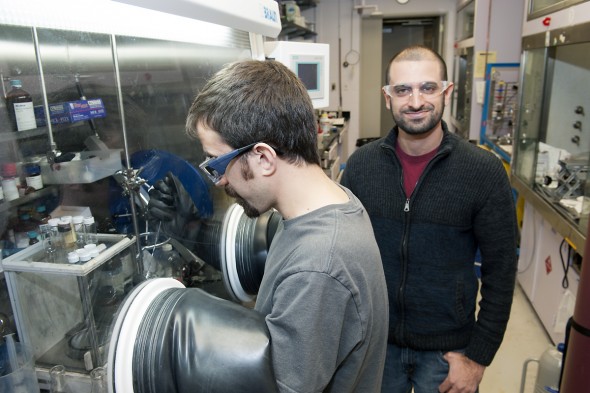Scientist wins Sloan fellowship

Neal Mankad (right), assistant professor of chemistry, was awarded a Sloan fellowship, given to early-career scholars. — Photo: Roberta Dupuis-Devlin
Neal Mankad, assistant professor of chemistry, was awarded an Alfred P. Sloan Research Fellowship for his research on fundamental issues of sustainability — finding ways to replace precious metals with earth-abundant elements in catalytic processes.
The two-year Sloan fellowships are awarded to early-career scientists and scholars of outstanding promise. They are given for distinguished performance and potential to make substantial contributions.
“The Sloan award has no budget we have to follow,” said Mankad. “It allows young scientists to pursue work in their group that may not be funded, that may be more risky, but that might, if they work, bring you a breakthrough result.”
There is a renewed push towards sustainability in all areas of chemistry, said Mankad. “But there is a lot of fundamental science that we need to understand before we get to the point that we can move to replacement technologies.”
Mankad wants to look at how evolution has solved the same problem. There are a number of biological processes that rely on inorganic materials, usually iron, copper or zinc.
“Living organisms couldn’t survive if they had to rely on platinum for electron catalysis,” he said.
Mankad believes fundamental inorganic chemistry can help explain how nature has evolved to solve these problems — lessons that can be used to find new catalysts. It’s an unfunded area of research for his team, though, and he has not been able to devote much time to it.
“I’m hoping that with the Sloan fellowship, we can add resources to help us build models and to help us understand how these bio-inorganic sites work,” he said.
“The more fundamental your science is, the more important it is to have some things you’re doing that aren’t very goal oriented, that you can kind of fish around,” Mankad said.
